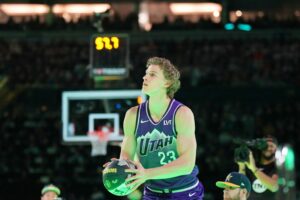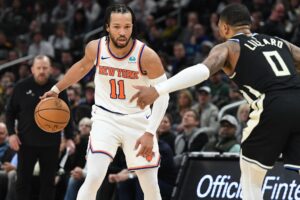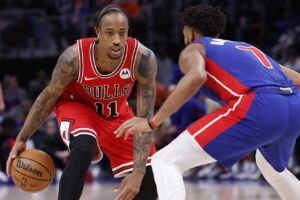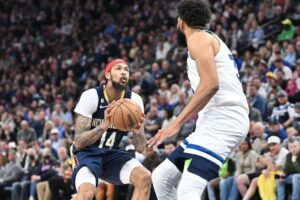In 2011, the New Orleans Pelicans (then Hornets) traded their franchise point guard, Chris Paul, to the Los Angeles Clippers. Without Paul, the future was bleak on Bourbon Street. However, on May 30 in 2012, everything changed. The Hornets jumped up from four to one in the draft order despite only a 13.7 percent chance at the first pick. To make things even better, this was one of those drafts with an obvious first pick. A superstar lock. Those do not come around very often. In 1969, it was Kareem Abdul-Jabbar. In 1997, it was Tim Duncan, and in 2012 it was Anthony Davis. To think that had the Pelicans fallen one pick short they could have ended up like Charlotte with Michael Kidd-Gilchrist instead. A close call, indeed.
While Davis lived up to his Kevin Garnett draft comparisons and superstar hype, the Pelicans made the playoffs only twice during the AD era. This brings up the question; why did the Pelicans fail to win consistently? Was it Davis? The supporting cast? Coaching? All of the above?
Why the New Orleans Pelicans Weren’t Good with Anthony Davis
For this examination, we are going to skip Davis’ first two seasons because frankly, he was not a superstar level player yet. While Duncan and Jabbar were high impact players right away, Davis was not. Davis entered the league at 19-years-old while the former consensus first-overall picks were 21 and 22, respectively.
2014-15 Season, Here Comes AD
In 2015, Davis put himself and the Pelicans on the map for the first time since the departure of Paul. He averaged more than 24 points and 10 rebounds with 2.9 blocks per contest. He became only the third player to ever lead the league in blocks in two of his first three seasons.
The Pelicans managed to barely squeak into the eighth seed of the playoffs with a 45-37 record. New Orleans somehow made the playoffs despite a myriad of injuries. Davis’ running mate and former all-star, Jrue Holiday missed over half of the season. Eric Gordon and Ryan Anderson, the fourth and fifth leading scorers for the Pelicans each missed 21 games. Out of the ten players who got at least 20 minutes per game, seven of them missed at least 16 games.
2015 playoffs, Davis has arrived
Come playoffs time Davis had the good fortune of making his playoff debut the Golden State Warriors. A 67-win team with one of the best defensive players of all time in Draymond Green and the best shooting backcourt ever with Stephen Curry and Klay Thompson.
Once again, Davis lived up to the hype as he averaged 31 points, 11 rebounds, and three blocks on 54 percent from the field and 89 percent from the line. Nobody else came to play for New Orleans. All the other Pelicans combined to shoot just 42 percent from the field and only Gordon matched his regular-season scoring average.
Throughout the 2015 NBA season, the Pelicans were a minus 8.7 with Davis off the court and a plus 5.4 with him on. They were also playing at a 47-win pace with Davis in the lineup while only going at a 35-win pace without him.
2015-16 Season, the Fall of Davis
In the summer of 2015, the Pelicans decided that, despite their best player being a power forward-center hybrid, to spend most of their cap space on below-average centers. Omer Asik got a five-year $52 million deal while Alexis Ajinca got $20 million for four years. Asik would go on to play only 1781 minutes for the Pelicans after signing this extension. A mere 201 fewer minutes than he played in the 2015 season alone.
The 2016 season was a mess for a number of reasons. First, the Pelicans decided to move on from head coach Monty Williams and replaced him with warriors assistant, Alvin Gentry. Hindsight is 20/20 but it’s easy to see now that this move was a mistake. Injuries again plagued the Pelicans as only two of the thirteen minutes leaders for New Orleans played 67 or more games. Davis missed a career-high 21 games that season while Gordon and Tyreke Evans combined to miss more than 90 games.
New Orleans was abysmal in those 21 games, winning only six of them, good for a 23-win pace. However, even in the games Davis did play, the Pelicans were bad. New Orleans went 24-37 with Davis in the lineup that year. This was probably the Brow’s worst season as a Pelican outside of his rookie year. While his basic stats looked almost identical, the effort clearly wasn’t there. Maybe it was due to nagging injuries, maybe it was an outside factor. The point is, Davis did not look like himself.
To this day it’s the only season that Davis shot under 50 percent from the field and also posted (non-rookie) career lows across the board in BPM, win shares, block percentage, and free throw percentage.
2016-17 Season, Davis’ Bounce Back
After the 2016 season, the Pelicans realized their mistake in overpaying two centers because that makes it tougher to maximize Davis’ ability. So instead of overpaying below average centers, New Orleans overpaid two below-average wings in Solomon Hill and Darius Miller. These two players were supposed to come in and replace the production lost by the departure of Gordon and Anderson. Gordon and Anderson combined to average more than 32 points per game while new acquisitions Miller and Hill gave the pelicans 16.6 points per game, combined.
Once again, the front office lets Davis down. For the third-consecutive season, injuries riddled the Pelicans. Holiday missed 15 games and Evans played only 26 games before being dealt at the deadline for Sacramento Kings star, DeMarcus Cousins.
New Orleans was slightly better in the 17 games Boogie played in but it wasn’t enough to even come close to a playoff spot. The Pelicans won only 34 games. The injuries and losses of Gordon and Anderson were too much.
Davis did all he could as he averaged career-highs in points and rebounds. The Pelicans were actually slightly outscoring teams while Davis was on the court but were a staggering minus eight when he sat. They had the third-best defense while he was on the court but the 29th ranked defense when he was off the court. Loss of depth and more injuries are a recipe for disaster.
2017-18 Season, Davis’ Ascension
For the first time in Davis’ career, everything clicked. The fit with Cousins was great and the Pelicans were playing well, starting the season 27-21, good for sixth in the Western Conference. Just when things were looking good for Davis and the Pelicans, disaster struck. Cousins had torn his Achilles in the final seconds of a narrow win over the juggernaut Houston Rockets. New Orleans’ playoff hopes shattered and doubt began to creep in.
Davis was having a good season to this point, averaging 26.5 points, 10 rebounds, and two blocks. With Cousins done for the year, the Pelicans needed to do something, and fast. In a rare smart move for GM Dell Demps, he got Davis the help he needed. On February 1, the Pelicans acquired sharpshooting forward Nikola Mirotic. With the addition of Mirotic, the Pelicans now could successfully run spread pick-and-roll with Holiday and Davis. It was devastating.
After going 1-5 in the first six games post Boogie injury, the Pelicans were the ninth seed and falling fast. Until the Brow decided to carry this lowly franchise on his back like never before. The Pelicans won their next ten games to climb back to the fourth seed. Davis averaged a whopping 37.7 points, 14.6 rebounds with 2.9 steals, and 2.9 blocks over his next nine games.
2018 Playoffs
New Orleans finished with the fourth-best record in the West and the sixth seed due to tiebreakers. Davis finished top-three in both the Most Valuable Player Award and the Defensive Player of the Year Award voting.
During the season, when Davis was on the floor the Pelicans had the seventh-best offense and eighth-best defense in the league. When he was off, New Orleans dropped to 27th and 30th, respectively. Davis wasn’t just the best player on the Pelicans, he was the Pelicans.
In his second career playoff appearance, Davis got to face the third-seeded Portland Trail Blazers. The Blazers were led by fellow 2012 draftee and All-Star, Damian Lillard. Portland was the clear favorite in this series with -220 odds to win the series but nobody told that to New Orleans.
Davis was already insane in his previous playoff appearance against a title team, what was he gonna do to a poor defensive team like the Blazers? Score, a lot.
Davis averaged 33 points 12 rebounds and three blocks on the way to a sweep of the Trail Blazers. Holiday played excellent defense on Lillard, holding him to just 18 points per game on 35 percent shooting from the field.
If facing the Warriors in 2015 wasn’t bad enough, Davis’ reward for beating Portland was to face the Kevin Durant edition of the Warriors. The Pelicans had no shot in this series. Even winning a single game was an achievement.
We didn’t know it then but the Brow’s final playoff game for New Orleans was a nine-point loss where Davis scored 34 points and grabbed 19 rebounds.
Davis’ 2018-19 Season, the Final Chapter
Through the first half of the season, he was having his best season yet. Only missing five of the first 46 games, Davis was a man on a mission once again. Cousins had skipped town during the offseason so it was up to Davis to try and carry the load alone once again. Through those first 41 games, Davis was averaging career-highs in points (29), rebounds (13), and assists (4.4). Despite his monster play on both ends of the court, the Pelicans could only muster a 20-21 record in those 41 games. New Orleans was a plus-3.5 with Davis on the court and a minus-six with him off it. Same old, same old.
It was at this point in the season that Davis sprained his left index finger and missed the next nine games. Naturally, the Pelicans won only three of these, and Davis was fed up. On January 28, 2019, trade was requested. From that point on the season was basically over. New Orleans did not want to hurt Davis’ trade value so they attempted to sit him out of games and restrict his minutes as much as possible.
The Pelicans would go on to finish the year 10-21 in an attempt to lose as many games as possible to win the Zion Williamson sweepstakes.
In Conclusion
The Pelicans let their superstar down. With a series of weird signings, bad coaching decisions, and unlucky injuries, the Pelicans were not able to build a successful team around Davis. Outside of 2016 when he was playing well below his standards, none of New Orleans’ failures are on him.
Today, even with new superstar Williamson and all of the talent acquired from the Los Angeles Lakers trade, the Pelicans can’t seem to win half of their games. With injuries or without, the Pelicans struggle mightily despite their riches of talent.
Main Photo
Embed from Getty Images






